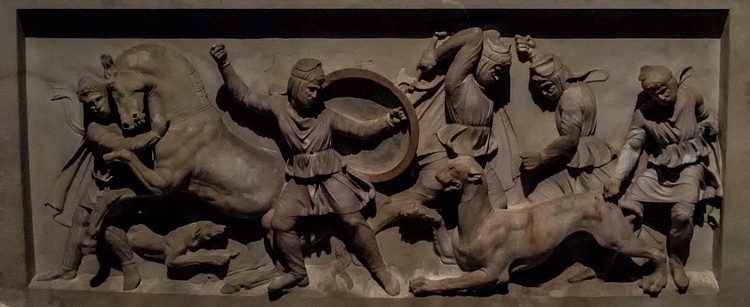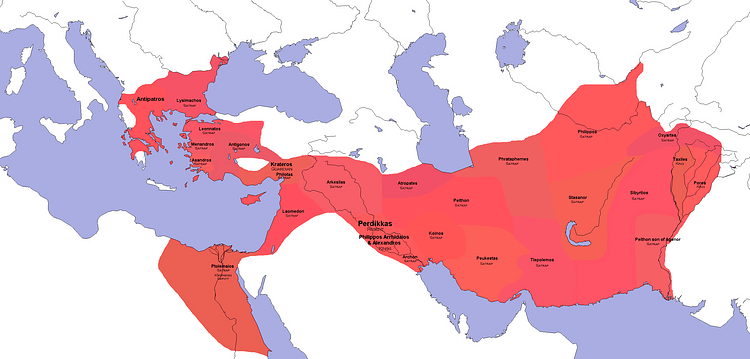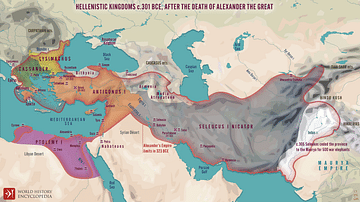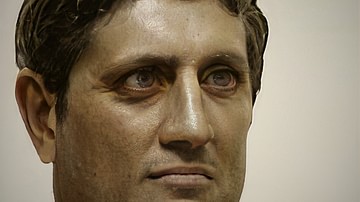
Perdiccas (d. 321 BCE) was one of Alexander the Great's commanders, and after his death, custodian of the treasury, regent over Philip III and Alexander IV, and commander of the royal army. When Alexander the Great crossed the Hellespont and threw his spear onto the shore of Asia Minor, he and his loyal army began a ten-year journey that would take them to the far reaches of Asia, amassing an empire unlike any that had existed before it. However, the young king's sudden death in 323 BCE left a vast kingdom leaderless and in disarray; there was neither an immediate heir nor appointed successor. Perdiccas stepped to the forefront to offer a solution. With the king's signet ring in his hand, he attempted to keep the empire intact. Unfortunately, others loyal to the king maintained a different opinion. In the end, the various commanders took possession of their small piece of the territorial pie, leaving Perdiccas with only a slim chance of rebuilding what had already been lost.
Early Career
Perdiccas stepped to the forefront to offer a solution. With the king's signet ring in his hand, he attempted to keep the empire intact.
Much of what history knows about Perdiccas is not flattering, clouded by the hostile account in Ptolemy's history of Alexander and his conquest of Persia. Ptolemy I and Perdiccas had been constantly at odds with one another since Babylon, a conflict that would eventually lead to Perdiccas' death. However, other than Ptolemy's history, most dependable versions maintain that he was about the same age as Alexander (possibly a little older) and was the son of Orontes, a Macedonian noble from the House of Orestes, a royal family that had once ruled a small independent kingdom in the Macedonian highlands but whose power had been stripped by Philip II, Alexander's father.
Initially, Perdiccas was a page in the imperial court at Pella, but in 336 BCE he became a member of Philip II's elite infantry, a shield-bearer or hypaspist. Later in the same year, serving as a king's bodyguard, Perdiccas was one of many who pursued Pausanias, Philip's murderer. The reason for the murder: Pausanias believed the king had betrayed him and sought revenge. When the assassin's boot caught on a vine as he hopped onto his horse, he was immediately slain by his pursuers. History still debates whether or not Olympias, Alexander's mother, had anything to do with the death of his husband. Many still believe she encouraged Pausanias to kill Philip to ensure Alexander's ascension to the throne. One of these was Plutarch who wrote in his The Life of Alexander the Great,
… when he found he could get no reparation for his disgrace at Philip's hands, watched his opportunity and murdered him. The guilt of which fact was laid for the most part upon Olympias, who was said to have encouraged and exasperated the enraged youth to revenge… (11)
Revolt in Thebes
Along with Parmenio, Coenus, Cleitus the Black, and Ptolemy, the young Perdiccas was one of a number of great men Alexander inherited from his father. Shortly after the death of Philip II, rebellion broke out across Greece, namely Thebes, Athens, Thessaly, and Thrace revolted. At the urging of the orator Demosthenes of Athens, many throughout Greece believed Alexander to be incapable of ruling, seeing him as only a young upstart. The new king set out to prove he was as good if not better than his father. During these rebellions, Perdiccas fought alongside the young Alexander in Illyria, and when revolt broke out in Thebes - they believed Alexander had died in Illyria - he followed his king southward. Plutarch wrote, "… he (Alexander) immediately marched through the pass of Thermopylae, saying that to Demosthenes, who had called him a child while he was in Illyria … he would appear a man before the walls of Athens" (12). 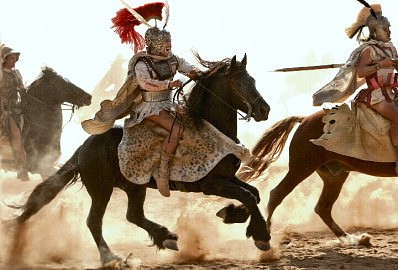
As "an eager young soldier who wanted to impress his king" (Freeman, 63), Perdiccas as captain of the guard was camped southeast of Thebes. Without consulting Alexander, he stormed the gates of the city and before anyone had realized it, was inside the walls, followed immediately by another battalion; the assault had begun, and with it "screams filled the air" (Freeman, 64). Although some accounts differ, Alexander had little alternative but to commit to the assault. Freeman wrote that the final result of the battle was one of "uncommon bravery mixed with butchery and horror" (64) as 6,000 Thebans would die while 30,000 were captured. The city itself was razed. The fall of Thebes had served its purpose as cities across Greece ceased to rebel. Perdiccas had proven himself to be a capable commander but at a price. In his The Campaigns of Alexander, the historian Arrian wrote that "Perdiccas was wounded while he was trying to break through the second palisade: he was carried back to the base, but the wound was serious and it was only with difficulty that his life was saved" (58).
Persian campaign & Alexander's Death
Perdiccas followed Alexander as he crossed into Asia Minor, fighting the Persians at Granicus, Issus, and Gaugamela. Throughout the Persian campaign, he received a number of promotions from a taxiarch leading a brigade of pezhetairoi to serving as a bodyguard in 330 BCE. Before the army was to meet King Porus at the River Hydaspes, Perdiccas and Hephaestion were sent ahead through the Khyber Pass with three battalions and half of the Companion Cavalry to gather supplies and prepare to bridge the river. Following the victory against King Porus, Perdiccas was next seen with Alexander in his clash against the Mallians, where the king received one of his more serious wounds, an arrow piercing his lung. Supposedly, Perdiccas was the one who removed the arrow.
It was at Babylon as Alexander lay on his death bed that Perdiccas came into prominence. It was there that the king handed his signet ring to his newly appointed chiliarch Perdiccas; earlier he had received the promotion to chiliarch or Grand Vizier after the unexpected death of Hephaestion. Now, with the king dead (June 10, 323 BCE), the empire he had built fell into disarray. Sadly, Alexander had failed to provide a successor. History tells us that the final words of the king were "to the best," but no one understood what these words meant. Although his wife Roxanne was pregnant with the future Alexander IV, there was no one to rule the empire, so Perdiccas assumed control on his own initiative. He also took control of the king's body with the intention of returning it to a tomb in Macedon. Actually, despite the beliefs of his fellow commanders, many agree that Perdiccas was a good choice. By most accounts, he was of royal blood and had a distinguished military career. And, while there were many who disliked him, especially Ptolemy I, he personally believed he was quite capable of managing a crisis.
Wars of Succession
The question of who should rule forced the commanders to come to an agreement. Perdiccas chose to support either Alexander's half-brother Philip Arrhidaeus (who was seen by most as a halfwit) or wait until the birth of Roxanne's baby; Philip would serve as Philip III until Alexander IV, born in August of 323 BCE, was old enough to rule. The meeting did not go smoothly. Although no one seriously favored Alexander's son Heracles by his mistress Barsine, Meleager, an infantry commander, led a short-lived revolt, favoring Philip III over Alexander IV - the unborn child was dismissed as being only half Macedonian. The revolt was silenced when Meleager was killed by Perdiccas in a sanctuary where he had sought refuge. To ensure her son's ascension to the throne, Roxanne, with Perdiccas' blessing, poisoned both Alexander's other wife Statira (Darius' daughter) and her sister Drypetis (Hephaestion's wife) and threw them down a well. Plutarch wrote:
Roxanne, who was now with child …. being jealous of Statira … killed her and her sister, and threw their bodies into a well, which they filled up with earth, not without the privity and assistance of Perdiccas, who in the time immediately following the king's death … exercised the chief authority. (72)
In the end, although the commanders tentatively accepted Perdiccas' plan, they opted to divide the kingdom among themselves. They met in the king's throne room at Babylon; Ptolemy I opted to rule Egypt, Antipater kept Macedon and Greece, while Antigonus I the One-Eyed received the majority of Asia Minor. Perdiccas received no territory or satrap, becoming instead custodian of the treasury, regent over Philip III and Alexander IV, and commander of the royal army. To spy on Ptolemy, Perdiccas chose Cleomenes of Naucratis to remain in Egypt as finance minister. Unfortunately, the plan of reuniting the empire would never come to fruition. The individual commanders and their descendants would clash for another three decades in the Wars of Succession.
Marriage became a problem for Perdiccas, at least when he attempted to use it for political gain. During Alexander's attempt to marry his commanders to Persian wives, Perdiccas received the daughter of the governor of Medea. Later, (little is known of his Persian wife) he planned to marry Antipater's daughter Nicaea and form an advantageous alliance; it was also prearranged for Ptolemy to marry Antipater's daughter Eurydice. Meanwhile, the now-widowed Cleopatra, the sister of Alexander the Great, traveled to Asia Minor having set her eyes on Perdiccas. Antipater and Olympias both sought him as a possible son-in-law; Antipater wanted him to marry Nicaea while Olympias hoped he would marry Cleopatra. Perdiccas was caught in a dilemma; to marry Nicaea would align him with the other generals, but to wed the heir to Epirus and Macedon, Cleopatra, would lead him to a throne in Pella. In the end he married Nicaea; however, he sent Eumenes, who commanded his forces in Asia Minor, to Sardis in Asia Minor to inform Cleopatra that he was planning to reject Nicaea and marry her in a complete betrayal of Antipater. Unfortunately, when she discovered he had already married, Cleopatra rejected the offer.
This sense of betrayal combined with Perdiccas and Eumenes' advance into Asia Minor gave Antipater and his fellow regent Craterus little choice but to join Antigonus in a war (322 -321 BCE) to force Perdiccas out of power. Antigonus and his son Demetrius had initially sought refuge in Macedon when Eumenes entered Asia Minor. The war would end with the death of Craterus, isolation for Eumenes, and Antipater taking Philip III and Alexander IV to Macedon. The reigning queen Olympias was not happy with the outcome.
Death & Legacy
Perdiccas had not participated in the war in Asia Minor; instead, in 321 BCE he was on his way to Egypt. Ptolemy I had kidnapped the body of Alexander in Syria and sent it to Memphis, later to be transferred to Alexandria. The two men had quarreled bitterly since Babylon, and with both Ptolemy's highjacking of the king's body and his murder of Cleomenes, Perdiccas believed he had little choice but to invade Egypt, defeat Ptolemy and seize both his territory and his treasury. However, in three futile attempts he failed to cross the Nile River. With the failure of his third and final attempt and a loss of 2,000 soldiers, the loyalty of his men began to falter as they had seen too many of their friends die. Desertions increased, bribes failed. In the end, three of his once loyal officers, Peithon, Antigenes, and Seleucus, entered his tent and stabbed him.
Perdiccas was a capable and loyal commander to both Alexander and the empire he had built. His one dream was to maintain the kingdom until it could be reunited under one leader, Alexander IV, the son of Alexander the Great. Unfortunately, he was not very popular with many of the old commanders, especially Ptolemy I of Egypt, and with the division of the territory at Babylon, the chance of any reunification died. In the end, Perdiccas lost control and his war with Ptolemy brought his death. The Wars of Succession would last another three decades, but Ptolemy's descendants would rule Egypt until the days of Julius Caesar. The king's beloved Macedon would fall into the hands of the Roman Empire. Alexander's dream of an empire had died with him.


